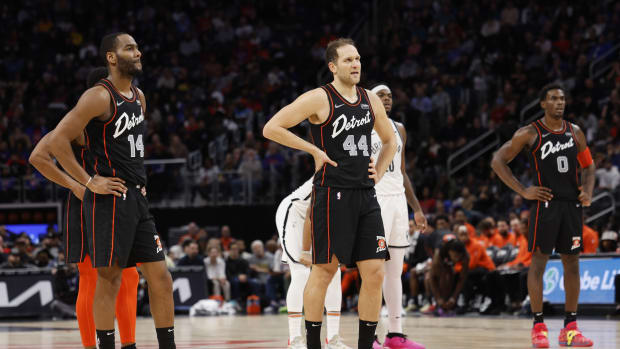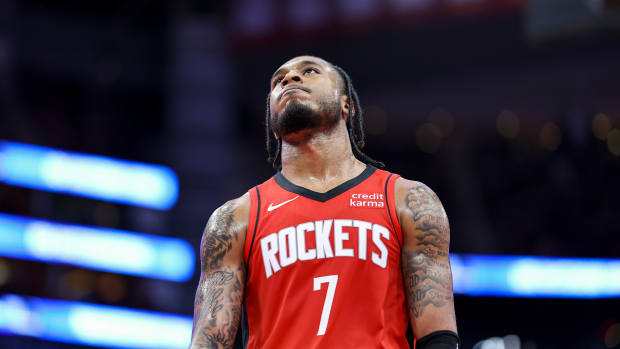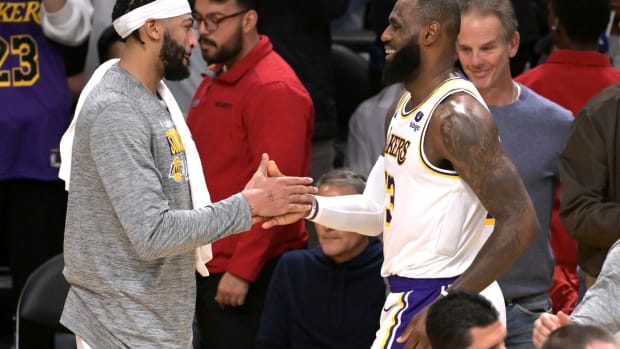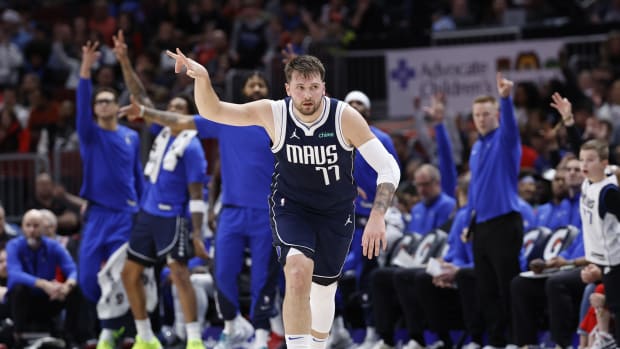Stephen Curry’s Shooting Defies Logic, Breaks Cavs’ Resolve in Game 2
“Two points ain’t two points,” LeBron James said but weeks ago, having buried the Raptors with a series of impossible turnaround jumpers. “That’s a lie.”
It's a lie perpetuated by the cold remove of the box score, a lie told by desperate coaches to wayward players. James knows better than anyone the power of every shot he takes. He's seen that his dunk carries an entirely different weight than his fadeaway. He knows that context transcends a line on the play-by-play. The points scored, in any case, are only the most simplistic measure of their value. Two points ain't two points.
And three points, as it turns out, ain't three. Stephen Curry forced LeBron and the Cavaliers to reckon with that fact during Game 2 of the NBA Finals, when his hot shooting seemed to ward off Cleveland at every turn. The Cavs persisted—trimming a 15-point deficit to eight, or a 12-point deficit to four—only to be blindsided by yet another Curry three. It's rare to see a Warriors opponent keep competitive through so many runs and counter runs, but rarer still to find a talent like Curry. His nine threes in Game 2 (an NBA Finals record) hit harder than the sum of their points would attest. They tipped the balance of the game and the series, turning a contested affair into a decisive 122-103 win for Golden State.
The NBA Has Never Seen a Shooter Like Stephen Curry
There is a backbreaking quality to Curry's long-range shooting not unlike the effect James had on the Raptors. On that night, LeBron brushed off even the most proficient coverage. Any who tried to bump him in the post would be caught standing still as he faded away into his jumper. Those who rose to challenge him would fall back down to earth while James floated on air. Every make made clear how little could be done to stop him. Curry (who notched 33 points, eight assists and seven rebounds in total) inspires a similar sense of helplessness—no matter how much Tristan Thompson dislikes that characterization. A mismatched big might do everything possible to deny Curry a three, only to bite on one of his hesitation moves and give up an open look anyway.
Or, in the case of Kevin Love: Stay attached until the brink of the shot-clock buzzer, only for Curry to toss up a turnaround 28-footer while running away from the basket. These are shots that challenge—or break—a team's resolve. You can hang with every one of the Warriors' most dangerous options, disrupt the pass to Curry on a cut, force him out of rhythm and into a terrible look and none of it means a damn thing.
What looked to be a great momentum stop at a pivotal moment instead feeds the frenzy of Oracle Arena. Golden State faced legitimate peril against Houston in the Western Conference finals. Yet in this series, the drama seems somehow artificial—couched in the fact that one of these teams is decidedly better than the other. Cleveland doesn't have the means to keep Curry under wraps, and worse yet: Curry knows it. He's taken the measure of the matchups—including the freedom to summon Love or Thompson at will—and played some of his most assertive basketball in years.
Those mismatches alone may force Cleveland to reconfigure its defense. The Warriors are so rehearsed in manipulating switches at this point that if Love is on the floor, Curry will find him. Consider it perpetual, enduring payback for Love stopping Curry on the most important defensive possession of his career. That single Game 7 scenario was a bottle episode within a much larger series—riveting, to be sure, but not quite indicative of the real dynamic at work. Curry can get whatever he wants against Love. If the desired look doesn't come from his initial moves, it usually materializes after Curry gives up the ball and relocates.
Warriors Use Balanced Attack to Pull Away From Cavs Late, Take Game 2
Every make from Curry kills, in part because more plausible attempts are so readily available. Any defense forced to mind Kevin Durant and Klay Thompson as they wind around the floor will concede something to Curry. Switching serves to make those concessions less glaring, though it doesn't erase them. It can't. Curry will slip through, and while Cleveland's bigs are able to shuffle along and get a hand up, rarely do they contest his shots with the kind of proximity that really matters.
Curry, meanwhile, is on the hunt. The nine threes he hit in Game 2 matched Cleveland's total as a team—on 10 fewer attempts. He's not beyond rushing into a long three on a whim, as if he were blindly throwing daggers. Enough of them connect to warrant trying; a loose, confident Curry is still the surest way for the Warriors to dominate, making the tradeoffs for those attempts largely worthwhile. If three points were just three points, it wouldn't matter that Curry pulled up from two feet behind the line. There would be no added value in the way he targeted Love, again and again, or how freely he fired away in transition. By LeBron's own logic, we know better.


































